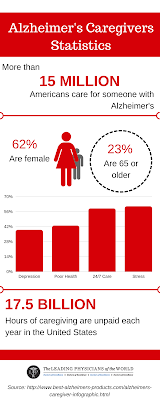Signs of Alzheimer’s Caregiver
Alzheimer’s
disease affects a huge percentage of the world’s population when you consider
people suffering the condition, their friends, family members and their
caregivers. A big percentage of people with this disease have behavioral issues
that are very hard to handle. Although being an
Alzheimer’s caregiver can be a rewarding experience, it can as well lead to anxiety, stress, depression and other health issues.
Statistics show that more than 75% of Alzheimer’s caregivers are concerned about maintaining their health since they became caregivers. If you have chosen to become an Alzheimer’s caregiver in your life, you should be prepared to reach out and offer any help when needed. Below are some of the challenges that are faced by Alzheimer’s caregivers:
It is very unfortunate caregivers spend much of their time caring about themselves when they are full time caregivers to the affected. If you are an Alzheimer’s caregiver, it you should share this article with others and as well share your own suggestion to help other caregivers know what is required to become a caregiver. Family member and friends may want to help you but they don’t know how.
Alzheimer’s caregiver can be a rewarding experience, it can as well lead to anxiety, stress, depression and other health issues.
Statistics show that more than 75% of Alzheimer’s caregivers are concerned about maintaining their health since they became caregivers. If you have chosen to become an Alzheimer’s caregiver in your life, you should be prepared to reach out and offer any help when needed. Below are some of the challenges that are faced by Alzheimer’s caregivers:
·
Fatigue and exhaustion due to increased caregiving demands
·
Elevated emotions due to lessened capabilities from the patients
·
Isolation and loneliness
·
Work and financial complications
Did you know that more than 5 million
people in the United States today are living with Alzheimer’s disease?
Statistics from Alzheimer’s Association predicts a rise up to 16 million by 2050.
Statistics also show that almost 80% of the care provided to people with
Alzheimer’s disease is given by unpaid caregiver’s mostly family members while
only 10% of care is given by paid caregivers.
Spreading
awareness about Alzheimer’s disease and understanding the role of a caregiver
is a perfect step. If you are in a position to, offer your help to an
Alzheimer’s caregiver. It is very unfortunate caregivers spend much of their time caring about themselves when they are full time caregivers to the affected. If you are an Alzheimer’s caregiver, it you should share this article with others and as well share your own suggestion to help other caregivers know what is required to become a caregiver. Family member and friends may want to help you but they don’t know how.
Tips for Alzheimer’s Caregivers
Below are 12 tips caregivers should
know before reaching out their patients:
1 Know the person well
The first step in caring for
Alzheimer’s patients is to know them well.
·
Gather their life
history
·
Know their
dislikes and likes
·
Know how you can
communicate with them better
2 Introduce yourself
·
Let the
Alzheimer’s patient know who you are
·
Explain to them
that you are there to care for them
·
Inquire for their
permission to offer care
3 3 Smile always
People with Alzheimer’s disease are
likely to notice your:
·
Body language
·
Emotional state
and
·
Tone of voice
4 Slow down
If you are a caregiver you should
relax and do things in an orderly manner. You should:
·
Give your care in
a relaxed manner
·
Keep your work
simple
·
Enable the
patient do things by him/herself
5 Make communication clear
·
Give each point
at a time
·
Use an
interpreter when needed
·
Make sure the
patient use hearing aides and glasses when needed
6 6 Keep their environment quiet
·
Always stop and
listen to them
·
Avoid crowds and
a lot of noise
·
Reduce any
disturbing noise
7 7 Step back
When the Alzheimer’s patient is
agitated:
·
Leave the place
·
Try to understand
what triggered their aggressiveness
·
Reach them later
when they cool down
8 Consider safety
·
Keep a safe
distance when caring for them
·
Approach them
safely
·
Give yourself an
exit
9 Don’t argue with the patient
·
Don’t tell them
when they are wrong as this will trigger a negative effect
·
Go according to
their likes
·
Respect and
acknowledge what the patient is saying or doing
10. Don’t
distract
·
Give the patient
a relaxed environment
·
Always give them
something to do to make sure they are not idle
·
Talk or yarn
about their lives
1 11. Share with
others
·
Share with other
people on what has worked in care for these people and what hasn’t worked
·
Always record
what you do in your caregiving practice
·
Discuss with your
friends all what happened during your practice.
1 12. Engage and
encourage
·
Make sure the
patient is engaged in meaningful activities
·
That the patients
and other for assisting you
Signs of Caregiver Stress and Burnout
No matter how resilient and strong you
may be when caring for Alzheimer’s patients, you are still likely to face
problems with certain aspects of Alzheimer’s care. Day to day stress, watching
your loved one’s health deteriorate, having to make hard decisions about the
long-term care can leave every caregiver exhausted and overwhelmed. Knowing the
signs of a caregiver stress and burnout can act as a solution to dealing with
the problem.
Signs of Stress
·
Anger at the Alzheimer’s patient.
·
Denial about the disease feeling that the
patient will get better
·
Anxiety about the future
·
Depression that sometimes affects the ability to
cope
·
Social withdrawal from activities and friends
that used to help
·
Health problems
·
Lack of concentration that make it difficult for
one to perform familiar tasks
·
Exhaustion that makes it hard for someone to
complete important daily tasks
·
Sleeplessness due to many concerns
·
Irritability that can lead to moodiness and
negative actions or responses.
Signs of Burnout
Prolonged and excessive stress from
caring for Alzheimer’s patients that leave one mentally, emotionally and
physically exhausted may be as a result of burnout. Warning signs of burnout
include:
- Deliberating depression
- Tension from excessive stress
- Decreased life’s satisfaction
- Persistence anger, guilt and anxiety
- Extreme anger or irritability
- Social isolation and relationship conflicts
- Weakened immunity
·
Excessive use of
drugs and alcohol
Burnout can affect the health of the
caregiver, so if you experience the above signs, it’s vitally important to take
action right away.
Solution to caregiver’s stress and burnout
·
Get moving-
Regular exercise is very important as help the caregiver become fit and as well
release endorphins that help boost mood.
- Seek regular respite care
- Talk to someone, maybe a friend or family member.
- Try to have fun often.
·
Try doing
something new as it will help flex your mental muscle and help relieve harmful
stress
·
See the funny side- Humor is a perfect antidote to anger,
illness, boredom and stress. Your mood is of great important both to you and
the Alzheimer’s patient.
Helping Alzheimer’s Caregiver
Below are tips to supporting or
helping Alzheimer’s caregivers:
·
Be his or her
friend
·
Be a good listener
·
Recognize the
caregiver signs of stress
·
Don’t wait to be
asked to help
·
Always show your
gratitude




Comments
Post a Comment